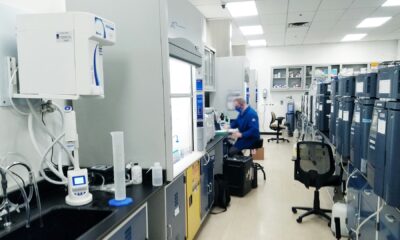Markets
Interest on Deposits Begins to Fall in Spain Due to the Refusal of Large Banks to Remunerate Them
Despite this succession of cuts in the profitability of fixed term deposits, European banks still offer profitability that exceeds the Spanish ones and is close to 4%. However, these remunerations have an expiration date the expected turn in the monetary policy of the European Central Bank (ECB) seems to be putting an end to those deposits that reach 5%.

Term deposits are one of the preferred products of conservative savers. However, during the time of negative interest rates, the deposits did not have remuneration (in individuals they were not collected).
When the European Central Bank started the price of money, those people who had liquidity began to demand interest, which has arrived, but in dribs and drabs and not from the big banks. This has caused the average interest to begin to fall.
Find more about the falling interest in deposits and read the most important financial news of the day with our companion app Born2Invest.
The bank rewards companies: it pays 33% more than individuals for their savings
A fall that, predictably, will be greater, since the market discounts that in June or July the ECB will lower interest rates, ending a more restrictive monetary policy that rewards savers and makes financing difficult. According to data from the Bank of Spain, the average interest on one-year deposits fell in December, for the first time in a year, to 2.59% from 2.62% in November , which was the highest average remuneration since December 2012. That is, the interest on one-year deposits has not finished rising and its fall is already being seen.
The all-time high for the average interest rate on one-year term deposits was recorded in October 2008. At that time, banks offered an average payment of just over 5%. At that time, the deposit facility interest rate was at 4.25%, 25 basis points above the current one (4%), but which may be lower in future meetings.
Conservative savers expected time deposits to be close to that 5%. However, it has fallen far short. And this time with the more restrictive monetary policy, the big banks have not remunerated these products because they do not need liquidity and because they attract clients through other offers in payroll accounts or savings accounts. In fact, many managers of the main entities assure that time deposits are not the best product to obtain profitability from savings.
The presidents of the five most important banks in Spain have refused to launch these products on a general basis. What’s more, some have a term deposit but in a personalized way, which are usually for linked clients. Ana Botín, president of Banco Santander, refused to offer term deposits under the Santander brand , but she did point out that anyone who wants a remunerated product of these characteristics can do so at Openbank, although she was surprised that they only paid 3.08%.
“If you don’t have customers in a restaurant, you don’t prepare meals,” commented the president, adding that Spaniards’ money is dispersed in accounts with small balances. The other reason they give lies in the fact that the price of mortgages in Spain is lower than other regions in which rates fluctuate above the 4.5% stipulated in the eurozone.
For its part, BBVA does not have a paid time deposit either. The entity chaired by Carlos Torres launched a product that paid 2.75%, but it was for specific clients and not generally. During the BBVA results press conference he again insisted that they do not need that liquidity.
However, both entities offer high-paying time deposits in other countries where they are present. Specifically, BBVA has this product in Italy with a profitability of 5% . Spanish banks that operate in other European countries offer deposits there that are on average between 3% and 5%.
Despite this, the expected turn in the monetary policy of the European Central Bank (ECB) seems to be putting an end to those deposits that reach 5%. According to HelpMyCash data, if in September 2023 there were at least 10 banks that paid 4% or more for their fixed terms, now there are only three left and they are for six months, which gives a lower total profitability.
“The market is anticipating that in June or July the ECB will begin to lower interest rates,” says Olivia Feldman, economist and co-founder of the comparator HelpMyCash, although the pace of falls will be lower than that of the organization during the rises in interest rates. guys. “Unfortunately, for those seeking profitability, this change is already having an impact on the products they can purchase now because banks are anticipating this possible decline.”
A clear example is Banca Sistema, which offered 4.40% on its one-year deposit a few months ago. Now the interest on its fixed term is 3.80%. “The next step in which the best fixed terms can be placed in the coming months could be below 3.50%,” insists Feldman, who recalls that “every day we see how there is a trickle of downward interest on the part of the banks and for all their terms.”
Despite this succession of cuts in the profitability of fixed term deposits, European banks still offer profitability that exceeds the Spanish ones and is close to 4%. However, these remunerations have an expiration date. For this reason, Feldman advises “moving your money very quickly and if you have money to invest in traditional banking products at around 3.80-3.95% you should take advantage of it.”
__
(Featured image by Mohamed_hassan via Pixabay)
DISCLAIMER: This article was written by a third party contributor and does not reflect the opinion of Born2Invest, its management, staff or its associates. Please review our disclaimer for more information.
This article may include forward-looking statements. These forward-looking statements generally are identified by the words “believe,” “project,” “estimate,” “become,” “plan,” “will,” and similar expressions. These forward-looking statements involve known and unknown risks as well as uncertainties, including those discussed in the following cautionary statements and elsewhere in this article and on this site. Although the Company may believe that its expectations are based on reasonable assumptions, the actual results that the Company may achieve may differ materially from any forward-looking statements, which reflect the opinions of the management of the Company only as of the date hereof. Additionally, please make sure to read these important disclosures.
First published in EL INDEPENDIENTE. A third-party contributor translated and adapted the article from the original. In case of discrepancy, the original will prevail.
Although we made reasonable efforts to provide accurate translations, some parts may be incorrect. Born2Invest assumes no responsibility for errors, omissions or ambiguities in the translations provided on this website. Any person or entity relying on translated content does so at their own risk. Born2Invest is not responsible for losses caused by such reliance on the accuracy or reliability of translated information. If you wish to report an error or inaccuracy in the translation, we encourage you to contact us.

-

 Markets2 weeks ago
Markets2 weeks agoWhy Sugar Markets Closed Lower This Past Week
-

 Biotech4 days ago
Biotech4 days agoPharmaMar Increases Profit by 64% in the First Quarter, Up To 2.3 Million
-

 Biotech1 week ago
Biotech1 week agoSpending on R&D in Biotechnology Increased by 13% in 2022 and Reached 2.56 Billion
-

 Business2 days ago
Business2 days agoTopRanked.io Weekly Affiliate Digest: What’s Hot in Affiliate Marketing [Changelly Affiliate Program]
























